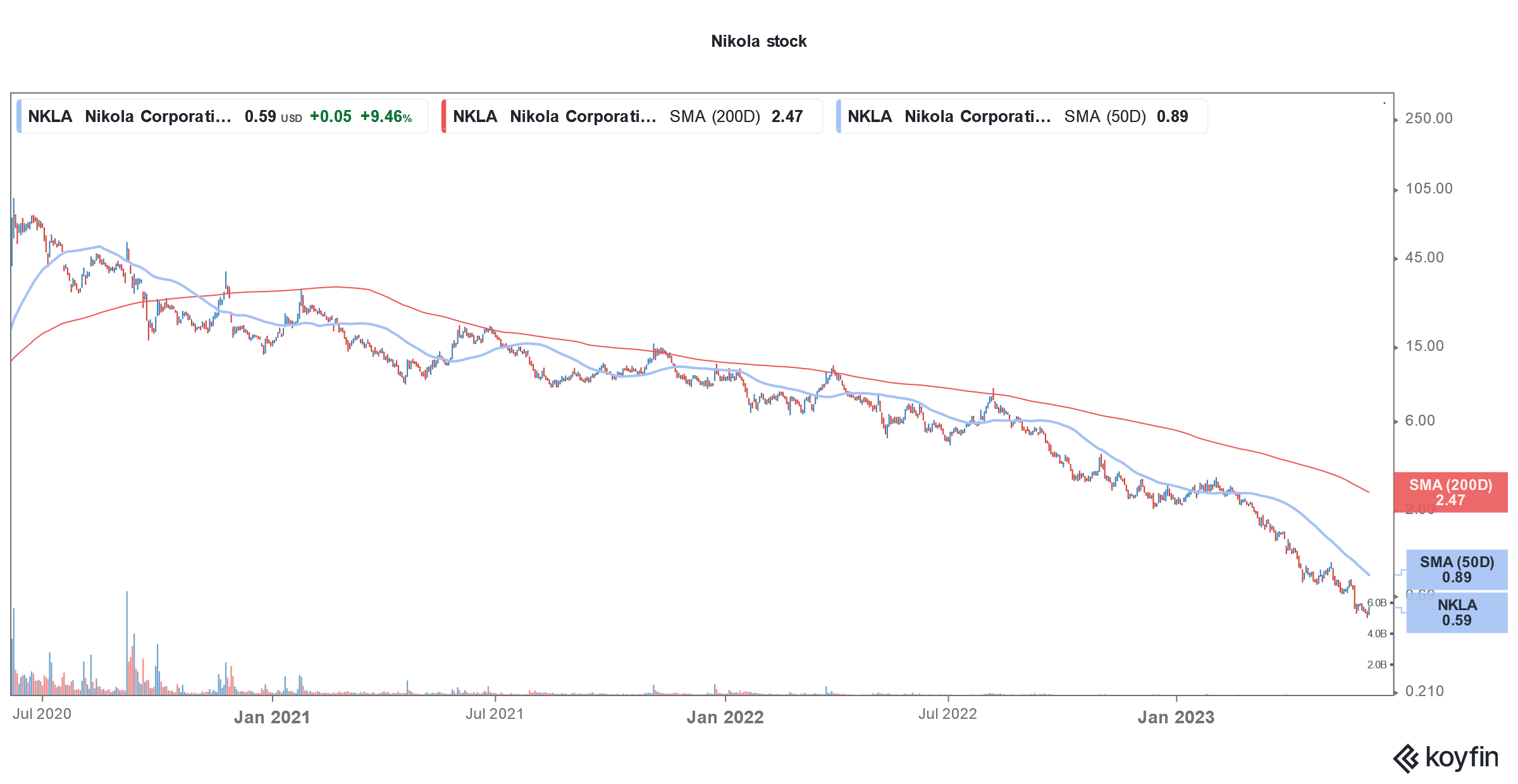Nikola Reconvenes Annual Meeting after Failing to Get Enough Votes for Key Proposal
Please note that we are not authorised to provide any investment advice. The content on this page is for information purposes only.
Nikola adjourned its annual meeting and would reconvene it on July 6 after it failed to get enough votes for a key proposal to increase its share count.
Nikola said that while it received the requisite votes for the other Proposals, it could not garner enough votes for Proposal 2 which relates to increasing its authorized share count.
In its release, Nikola said, “More than 77% of shares voted through June 6 have been in favor of Proposal 2, but more time is needed to obtain the required vote.”
Nikola reconvenes shareholder meeting after key proposal stalled
It added, “While the other proposals that have received the necessary votes required only a majority of shares voted on such proposals, Proposal 2 requires a majority of all outstanding common stock to pass.”
The company has “urged” all stockholders to vote for Proposal 2 “immediately.”
Notably, like fellow startup EV companies, Nikola is burning a lot of cash and has raised capital multiple times since its SPAC merger.
Nikola is restructuring its business
Nikola is restructuring its business to conserve cash and focus on key priorities. During the Q1 2023 earnings last month, it said “We have reprioritized the business, focusing on the North American market, hydrogen fuel cell trucks, HYLA hydrogen ecosystem, and autonomous technologies, vehicle controls, and software.”
It also said that it is selling the stake in the European manufacturing joint venture to Iveco Group for a cash consideration of $35 million.
The company ended March with cash of $206.3 million and raised another $100 million in April.
It is lowering its cash burn and targeting gross margin breakeven by the end of this year and positive EBITDA by 2025.
The company might however need to raise more capital amid the continued cash burn.
Nikola is looking to raise more cash
In its release, Nikola said, “Nikola’s Board of Directors and leadership team believe it is in the best interest of Nikola and its stockholders to move Proposal 2 forward, to ensure Nikola can continue its ongoing operations, including the need for capital.”
It added, “Nikola is only weeks away from the initial commercial production of its hydrogen fuel cell electric truck. Without the approval of Proposal 2, Nikola’s business objectives will be delayed or compromised.”
EV startups are burning a lot of cash
EV startups are burning a lot of cash and need a continuous supply of fresh capital to bridge the gap. Last month, Lucid Motors announced a $3 billion stock sale which was preceded by a $1.5 billion stock sale late last year also.
Rivian also raised $1.3 billion through a convertible issue earlier this year. Arrival has also raised capital in order to fund its operations. It eventually opted for a second SPAC merger to raise more funds.
EV companies are struggling with execution
Almost all the startup EV companies are struggling with execution and perennial losses and cash burn.
Nikola for instance expects to build only between 250-350 battery semi-trucks in 2023 and between 125-150 trucks powered by hydrogen fuel cells.
The company’s production targets are quite modest considering what it was originally targeting. But then, we cannot single out Nikola alone as the same story is playing around in almost all other startup EV companies.
Lucid Motors for instance expects to produce above 10,000 cars this year – which is a fifth of what it guided for during the SPAC merger in 2021.
Lordstown Motors is also producing only a handful of cars and the production is running way behind the original schedule. It has also warned of bankruptcy if Foxconn walks out from the funding deal.
SPAC bubble has burst
When Nikola went public in 2020, it was among the first EV SPACs (special purpose acquisition companies). At its peak in 2020, the company’s market cap was in excess of $30 billion and it surpassed Ford’s then valuation.
It was among the early signs of an impending bubble in EV stocks. However, thanks to the Fed’s accommodative monetary policies and scores of SPACs hunting for EV targets, the bubble continued to build and only got bigger by the end of 2021.
The SPAC bubble has since burst and many de-SPACs, or the companies that went public through SPAC reverse mergers are now fighting for survival.
Nikola received a listing warning
Last month, Nikola received a delisting warning from the Nasdaq for not complying with the minimum listing conditions.
The Nasdaq listing rules mandate that stocks should have a closing price in excess of $1 for 30 consecutive business days – a level that Nikola stock hasn’t crossed since April 11.
If a stock is not in compliance with the listing rules it gets a delisting warning from the exchange. To be sure, Nikola is not the only company that has got the warning. In the EV (electric vehicle) space only, Arrival, Canoo, and Lordstown Motors have received delisting warnings from the exchange for not satisfying the minimum listing conditions.
Between 2020 and 2021, loss-making companies were able to raise capital quite easily due to the availability of easy money.
Now, as Fed has raised rates to multi-year highs, startups face a funding winter. Even some of the listed names are facing trouble raising funds as not many investors are willing to back perennially loss-making companies with unproven business models.
As for Nikola, like other startup EV companies, the road ahead looks quite bumpy amid a deteriorating economy and rising competition in the EV industry.






